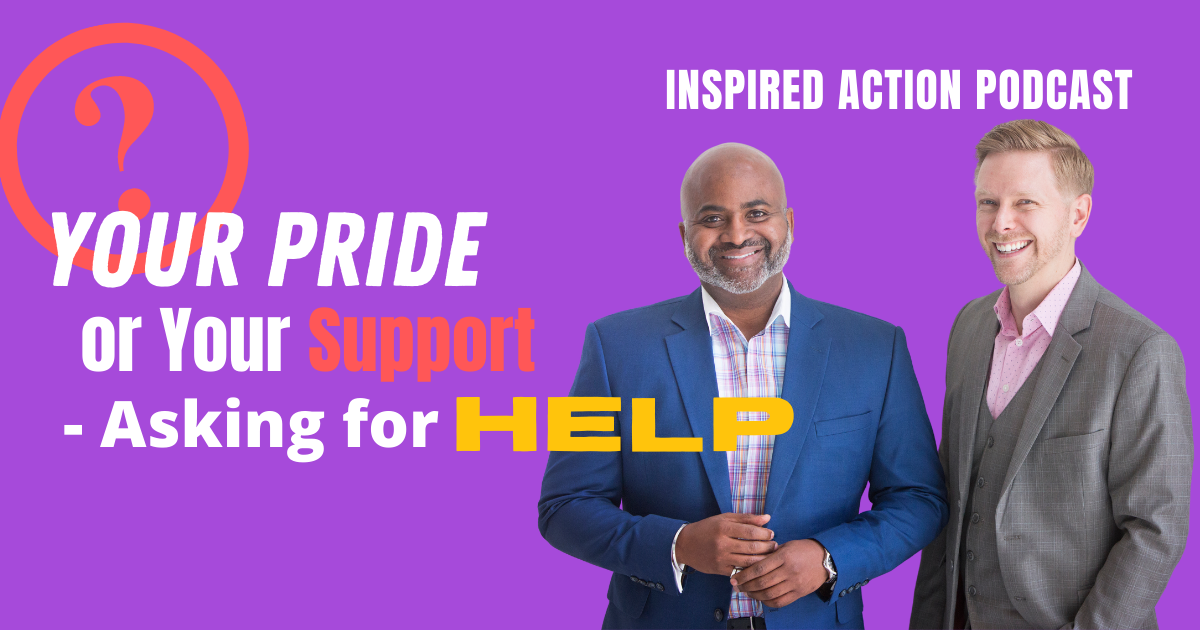“Your Pride Or Your Support” Brief Summary:
Is it difficult for you to ask for help? Do you take pride in not asking for help? In this Inspired Action For Imperfect Humans podcase episode Christopher Lawrence and Kyle Kalloo discuss asking for help, knowing when to ask for help, and why taking pride in not asking for help can actually be a detriment to a healthy mindset.
Calls to Action:
Tell us your “inspired stories” stories by visiting www.InspiredActionPodcast.ca
Christopher Lawrence LinkedIn: https://www.linkedin.com/in/career-life-coach-christopher-lawrence/
Kyle Kalloo LinkedIn: https://www.linkedin.com/in/kyle-kalloo/
Change My Life Coaching & Partner Groups LinkedIn: https://www.linkedin.com/company/6446498/admin/
Change My Life Coaching: https://changemylifecoaching.ca
Strategic Leader: https://strategicleader.ca
Resources:
The Science of Asking For Help: https://www.everywoman.com/my-development/learning-areas/articles/science-asking-help-—-and-8-ways-you-can-do-it-effectively
“Your Pride Or Your Support” Transcript:
This is one of the number one things that I hear from my clients. I hear it’s like, well, have you thought of asking for help? And then people get these grins on their face. Almost like it’s a thing of pride. Like, oh, I suck at asking for help. I’m not good at asking for help, which this is not something to be proud of. This is something in your development, your childhood development, that was not nurtured.
[Narrator] Is the thought of being imperfect, keeping you from taking action? Welcome to Inspired Action for Imperfect Humans. Each week, we give you real life stories and thought-provoking research that inspires your soul to live a more fulfilled life through your own actions. From the heart of Calgary Canada. Here are your hosts award winning coaches, Christopher Lawrence and Kyle Kalloo.
Hello, hello, welcome to Inspired Action for Imperfect Humans. Ladies and gentlemen, I would like to talk about my lighting today, which you’ll be able to see this on our YouTube, because we actually had some feedback from people saying how come Kyle gets the good lighting and I, this poor little white boy stuck with ashy skin and on a cloud a day. It doesn’t look too bad right now ’cause I’ve got the sun shining on me. The one piece of brightness I have in my day working with Kyle.
I will say, just because he’s white, doesn’t mean it’s bright. And I thought that actually sent me over the edge. Listen, let’s not talk about the lighting. ‘Cause I have to have good lighting. I used, I traveled with Harper Productions, okay? I–
Oh, you do like, I look at this and it’s like in his home, like if you don’t know, Kyle is pretty famous on TikTok. How many followers do you have now on TikTok?
About 480,000.
And all he does is these little cute Jamaican dances with his big booty sticking out. And so like, literally you got your breakfast 50% off because somebody recognized you from TikTok.
Yeah.
So, do you know Sheena Melwani?
I don’t think so, do I?
Yeah, you do. Okay, so hang on. This is really important for our listeners. Don’t download TikTok that’s my warning, it will take over your life. I had to delete it from my phone because I lost all my productivity. Kyle, what’s your TikTok handle in case people wanna check you out?
Oh man, don’t do that, but it is chancellor_K.
Chancellor_K? And the case stands for crazy. So, like Kyle is now an influencer I guess, in any case, there’s this woman, her name is Sheena Melwani I think. And so she’s really funny. She’s got a degree in music, she sings beautifully. And when she starts, she’ll record herself singing and then her dad who is Indian.
Right, yeah, I know her.
And has an Indian accent, starts to criticize the lyrics of the song. And he’s like, oh, and now he’s started this thing where he follows her around with his phone and posts on his TikTok.
Oh, okay.

And he’s like, now the influencer is doing this. And he’s like just making fun of her the whole time.
Yeah.
And so it’s like…
But you know what’s interesting? He speaks to like a lot of her uncles, he speaks like, which is very hypocritical.
Oh, he’s so, he’s like close the windows, close the door. He’s so funny.
No nonsense approach because it’s the simplest things. Like I remember saying to someone, in our family about the cash app, my cousin was like, “Hey mom, what’s your cash app, “let me send you some money.” And she’s like, “What do I need the app for? “Just give me the cash.” Like, it’s just this–
Right, yeah, so he’s, this guy is so quick-witted, he’s so funny, he’s so sharp. Like, she’s beautiful, she’s funny. Anyway, I think that I should follow you around with a camera and it’s like–
Oh God.
Now the influencer is doing something really silly, ’cause that is, most of my life here is trying to keep Kyle in line.
I think I had an ex who said to me once, “For smart person, you’re really stupid.”
Oh girl, that was either me or Bradley because you only have two ex’s.
It’s like what?
So it was probably me because Bradley is too kind for that. Bradley is way too kind for that. It’s funny, like we started, Bradley and I started a support group called the Former First Wife.
Yeah. Former First Lady.
The funny thing is that with your dating track record, it just hasn’t been very popular.
That’s all I needed. That’s all I needed to hear not to do that, but that’s interesting.
I don’t know why you don’t ask for help. Why don’t you ask for help with dating?
Oh man, that’s interesting ’cause I have a different take on asking for help. And I know I’m not the only one and I’m not–
Oh, ladies and gentlemen, close the windows, close the doors and grab your seat because we’re about to sit down and get–
I am not comfortable in knowing that there’s other people out there, so it is what it is. No, I’m not, I’m just saying that I had a recent experience, I wanna share that with you if you’re okay with it. And maybe while I’m doing that, I’m curious about some of the research–
If I say I’m not okay with it, do we have to still do this?
Yes.
So and I had a different type of upbringing with the word help, and which I didn’t even know, it wasn’t as deliberate as I think most people think it is, at least I know for me it wasn’t, but let me just tell you a situation. So today we’re really gonna talk about, why is it so difficult to ask for help and what can we do about it, right? ‘Cause that’s the other thing is, what do we wanna be able to do about it? And I can show some stuff that I’ve done for myself to do it. Now I am really gonna go to a place of vulnerability here, Christopher, and you don’t see that often, and so, bear with me–
Are you asking me to be kind and not smarmy? Is that what you’re thinking?
Yes, ’cause then it will teach me not to do it. This story I’ll tell myself is–
Let me tell you something, how come you only learn those lessons? How come you only learn the lessons that teach you not to do what you’re supposed to do? Based off my behavior? Well, how come based off my behavior, you’re not more organized? Or don’t have better follow through, I just…
Oh man, 1812.
Can we just talk about that?

In other news, welcome to 2021. So I, as you know, you certainly in Toronto and usually, and it’s a bad habit, especially when I go to places that really have variety of foods and different things, I tend to bring back with me, right? So I went to one of my favorite places in Chinatown, in Toronto to have Chinese food. And so I went there and it was a little quiet ’cause the whole, it was a little bit later on at night. And so I had this couple, I kind of figured that they were traveling because of a situation that happened later on, that they were traveling, they’re visitors of Canada, and so I had my meal ’cause I ordered just enough to eat, but I know I’m gonna bring the food back with me, right? So if you ever go on the flight and you smell food, it’s probably me. I’m bringing food on planes that shouldn’t be on there. So I’m bringing something back. So I deliberately ordered some stuff, so I know I can bring it back. So, after the bills came, the guy next to me, him and his, I think him and his wife were eating. And I noticed that they were having conversation a little bit hushed and it’s about money. And that’s the other thing. And Christopher, you do this, even though there’s no need for this to happen, when we talk about certain things, particularly money, you whisper, do you know you do that? And I’m like, why are you whispering?
I only know that I do it because you bring it to my attention. And I do often like talking about somebody, not like gossiping, but just like we have to have a conversation. I do lower my voice, which is not about practice to have.
That makes sense.
Because here’s you blazing up in every other restaurant, whatever, girl, he’s talking about the server at the top of his lungs and–
No, no, I’m just saying which are we talking about money? And it could be the simplest of things like, hey, we should probably check the bank account if we have the… And I’m thinking, no one is listening, no one is here, it’s just you and I, why are you whispering? When it comes to money and it could be the simplest thing, hey, I need to deposit, hey, we should probably deposit. I’m like, who’s gonna hear you. And I’m always looking around like, why the whisper? Like is just, or we’re in a car driving and you’re talking about money and I’m like why are you whispering.
It’s so funny, I don’t know. It’s really funny though.
Anyway, so back to this couple, so here they are, they’re whispering a little bit. And so, I have the hearing of a hawk. Is that the visual hawk or hearing hawk? Well, I have the hearing and so I heard they’re talking about money. You can’t see Christopher right now, but he’s dying. He’s muted his mic and he’s dying because he knows–
Kyle, the metaphors are amazing. Like he’s like, I have the tenacity of a ballpoint pen and I’m like, I have no idea what you’re talking about. What are you talking about?
Oh man, we must be coming close to season two ending. Anyway, so–
Actually this is our last episode for season two. And then we’re gonna get into season three. And we’ve got a bunch of new stuff.

Okay, hold that thought… Yeah, we’re gonna talk about that, hopefully in a bit, so I’m hearing these guys whisper about the money and these people were listing going, Jesus guys, just tell the God damn story because we keep segwaying to different things. So these guys are whisper, they’re whispering about something with money. And then after a while, he finally, I could sense that he’s looking over at me and then he finally says, “Excuse me, sir.” And I said, hi. And he goes, “I’m so embarrassed to say this, “to kind of ask you this question.” And I said, what is it? And he goes, “Oh man, I was just wondering, “do you have like an extra $3 or something like that, “to afford a bill?” And I said, yes, not a problem, right? And I took out a $5 bill and I gave it to him and they say, “Oh, here we have like, let me give you a $5 U.S.” So it’s not like they, I don’t think it’s, they didn’t have the money. It’s just they had only American money and this place only accepted cash, right? So they couldn’t use their credit card.
Yeah, I wonder if maybe they wouldn’t accept.
I don’t know–
Like if they didn’t know that most Canadian businesses will accept cash.
Is okay, yeah.
We mostly don’t do the conversion on U.S money, so we just translated as Canadian dollars at par. But most businesses will take U.S cash.
Hands down, they’ll say, oh we’ll give you $5 for–
Because they’re gonna, they’ll make sure, yeah.
Yeah, ’cause–
They’ll make sure when it goes in their bank, they getting a conversion on it, yeah.
Right, so I didn’t know if he didn’t know this or not, but I wasn’t gonna get into it. So I gave him the $5 and he goes, “Oh, I was so embarrassed.” And I said, never be embarrassed when you’re asking for help. Like, I just don’t know where that came from, but that was just the top of my mind. I’m like never be embarrassed when you’re asking for help. And I, and then it made me think how many times are people embarrassed to ask for help? And it made me reflect on my own thing around, why don’t I ask for help? And there’s things that in our business and even in our friendship that you’ve said, why didn’t you just ask for help? Why don’t you just tell people you need help, right? And I’m gonna tell that story a little bit later, but coming back to these guys–
Well, everything in this podcast is happening later, and I just wonder if we’re gonna get to any of it. My husband is the same way, like, he is the worst at asking for help. We started a new initiative, right? So it’s like, my youngest brother lives with us. He’s a roommate, right? He’s not a dependent, he’s a roommate. And so he lives, he rents a room in our house and we’re all focused on eating healthy. So I kind of brought the team together and said, okay, we’re all gonna cook together, we’re gonna prep together, cook together, and get this show on the road because we’ve got to do things. So we’ve been doing this for about a week now and it’s going really well, except I constantly have to like pull my husband away from the kitchen and say, oh, are you gonna ask for help? Are you gonna ask for help? And he’s like, “Right, right.” It’s like, he’s touched a hot plate or something.
Right.
‘Cause he constantly forgets, ’cause he was mostly taking responsibility for it. I’m like this isn’t fair, we all want to eat healthy. It shouldn’t all be on him, let’s split the workload here, right? Good old Saskatchewan, farming family, that’s what we did. And although I didn’t farm, my grandma did, and so this has been instilled in us. And so we do this, but my husband is the absolute worst person for asking for help on the planet, more so than you, which is hard to believe.
Damn, okay, so we’re gonna come back, ’cause I think maybe Vince and I have something similar around the asking for help, it’s–

Well, this is, I’m gonna sidestep for a second. And then I’m gonna go social justice for just a half a second. This is one of the number one things that I hear from my clients. I hear it’s like, well, have you thought of asking for help? And then people get these grins on their face, almost like it’s a thing of pride. Like, oh, I suck at asking for help. I’m not good at asking for help, but this is not something to be proud of. This is something in your development, your childhood development that was not nurtured.
Right.
It is not a weakness to ask for help. And in fact, in a lot of circumstances, it’s actually stupid to not ask for help. Like that is a limitation you have, like, people don’t get it. Like, there’s this weird thing that we do, I don’t know if it’s just Canada or North America, but I see it with a lot of Canadians where it’s like, we just don’t ask for help. We don’t ask for what we want and need. And it drives me nuts because it’s like, your life could be so much easier if you just asked for a little bit of support and it’s like, well, it’s not that easy. And I’m like, it’s not easy because you’re not practiced at it.
Totally, and I don’t think–
There is no badge of honor in fierce independence. There is for some circumstances, certain things we do need to learn to stand on our own two feet, so we’re not co-dependent, but asking for help is not co-dependency when it’s done appropriately and infrequently like, I don’t get this.
And I don’t think it’s just a key thing. I think a lot of it is external to North Americans. ‘Cause I, there’s just a lot of pride, there’s a lot of showiness, there’s like–
Bear enough.
Adaption, what do they call that whole thing of who’s who? Just what do other people think? And I wanna get to that later in our podcast. Hopefully–
Boys and girls, ladies and gentlemen–
It’s like in the corporate world, let’s take that in the offline room. Where’s exactly is the offline room?
And non-binary folks, this, we will not get to all of these things in this podcast. like, it’s, I need you to know that.
Anyway, let me get back to the story in the restaurant. So I gave him the $5 as I said, they were like, “Hey, here’s $5,” I said, no, let me do this for you, not a problem. And of course his wife was like, “Oh my God, thank you so much.” Especially when she heard the part about never be embarrassed about asking for help, right? And so, we finished that, they’re still talking about it. So now I’m at the cash, I’m gonna pay cash for my stuff. And I kinda heard her and her husband a little bit further back said, “Really, are we still shredded dollar?” You know what I mean? I just thought, I’m not sure what’s going on. Maybe it’s a calculation or something, I don’t know, so I said to them, to the server, I said, without saying anything, can I just pay for both of their meals, right? Let me pay for it, add it to my meal, let’s just call it a day and go from that. And she’s like, “No problem.” So I paid for the meal and you and I, Christopher, you know there’s times we do this. We like to exit when we do it, right? We don’t usually wanna be around when they find out, we just wanna get out, ’cause that’s–
We usually unless I think the server is untrustworthy.
Yeah, ’cause sometimes the servers are so, sometimes impacted by it, that they just, they’re so excited, they have to tell, right?
Totally.

And that’s usually has happened. So sometimes we get caught and then the person’s comes over to us. And sometimes if we feel away by, but anyway, I just said, here’s an opportunity where I can help. So regardless of what situation or just, you know what? Just my treat, let me pay for the bill. So I paid for it and I exit right away. And I had to walk up the street to where I was staying. So, I start to walk, then I hear this guy running behind me. He’s like, “Excuse me, sir, excuse me, sir, excuse me, sir.” Right, and so I turned around and it was the guy, it was a husband, right? And he comes up and he has the money in his hand. He goes, “No, please let me pay you back.” And I said, listen, let me do this for you. It sounds like you’re visiting Canada, right? And he goes, “Yes.” And I said, well, this is my Canadian gift to you, welcome to Canada, right? And he goes, “No, I just feel that–” I said, don’t feel any way, when someone wants to help you let them and I want to help you. So let me, and he just froze. And I didn’t know what was gonna happen, ’cause I started to feel a certain way by his look, and I just put my hand on his shoulder and I said, you have a fantastic trip, and I turned away, I didn’t look back, I didn’t hear him walk away.
Oh girl, I’m gonna like, cry right now.
I didn’t walk away, and so, as I was walking to my hotel, I was thinking to myself, I’m like, why do we struggle with this thing of asking for help or feel a way about asking for help. And so, I start to reflect on some of my thing. I am growing up for me and things I’ve done, I’ve been quite independent only because I remember a conversation that I had with my mom when I was quite young, and she took me everywhere. She took me to do groceries, she showed me how to cook, she dressed me, she showed me what to buy, she did all these things, and one of the things she said to me is, “I’m gonna teach you how to do everything, “because I never want you to depend on someone else.” I did not know that stuck with me, and the story I told myself from that moment was I have to do everything. And so I start to do everything, I–
I don’t think she was wrong in what she did, I wonder how that’s gonna fair as you age or in times in your life when you do need to seek help. Because we do like, we’re human beings, we’re community driven.
Yep.
Can’t get away from that. Even people who are fiercely independent, the vast majority still require a friend or two.
Absolutely, I think I’ve called, I think I’ve done better, ’cause something like, conversations you have had over a friendship–
Oh girl, I don’t know, let’s ask the team.
We had and one of the things, I don’t know if you remember, but I will remember this day and trust me we do not have time in this podcast for you to add your commentary to it. So I’m just gonna put that out there by saying you can summarize, but don’t get into the details of it–
Are you trying to control what I say now, are you trying to control what I say? Now you guys know why we’re not together anymore, it was totally controlling.

No, we were dating. And one of the conversation you said to me, we were having this conversation with somebody. I said, oh yeah, I’ll get it. Oh yeah, I’ll do it. And then you said, “I don’t actually know my place in this relationship,” something along the lines. So I’m paraphrasing another, I don’t know my place in relationship because you’re so independent and you do everything that I don’t feel like I’m contributing to this relationship, right? And I’m not saying it’s a 50, 50, I’m not saying I need to do it all, but you’re like, and that’s when it hit me that, and it was after the relationship, it hit me that, all you want to do, so much to what you just said about community, is to contribute. So now even if I can do it myself, I’m deliberate about the ask. I will engage my friends, family, and even colleagues, right? People on the team. And I will ask, hey, can you do me a favor? Could you do this for me? Hey, could you help me with this? I can do it. So it’s not, it’s no longer about I can’t do it. Which is what I think some of the research is showing that people think that we were admitting fault or incompetency or we just can’t get it done, right? Like, it’s on us to always do. And I’ve learned through the years that it’s not always on us. I want people who are close to me or others to feel contribute. And here’s the thing, I know the, we’re hardwired to feel that we have to do everything, right? Fend for ourselves, do things ourselves. And that’s why it’s necessary for us to kind of step into that because people want to help. I found, when I said to someone, hey, can you do me a favor? They’re somewhat resistant a little bit, they’re like, well, it depends, why, what’s up? So they’re very hesitant, and you know what I started to do, Christopher, I start to say, hey, I need your help with something. And do you know many people said, “Oh yeah, what’s up, “let me see if I can help.” They were really eager when I use the word help versus a favor. I’m not sure what the science is on that, but I just know that’s what I’ve noticed. And so when I want someone to really engage or be connected, I will use the word help. Like what do you think about that? What is some of the signs? Is there any signs on this thing? Is there like what can someone do about it?
Yeah, so I’m glad you asked. I came across this article. We’re gonna put this link in the description of the podcast. This is from everywoman.com and it’s the science of asking for help and eight ways you can do it effectively. And I’d like to actually spend quite a bit of time on this, Kyle, because I think it’s important for people to understand this because obviously this is not a natural talent for a large majority of our population. So I think if people wanted to pull out a pen and paper right now and take some notes, this would be the time or listen to this podcast again, share it with your friends that suck at asking for help because they probably do too.
Yeah, we have people.
Yeah, so here’s some of what this says. So the first thing is that we have to work out what we really need. So often when we’re becoming overwhelmed, we can stay straight from strategic to reactive. And it’s key that our state of mind remains effective and focus. So when we’re asking for help, we need to work out what we really need, what is it that we need? We work with this, with clients all the time. I often ask my clients what they need and they’re so big. I need empathy. And it’s like, what does empathy look like? Why, just need people to understand. And I’m like which people to understand what?
What, yeah.
And what does understanding look like if you cannot identify what you need, nobody around you knows it either. Like if I ask you that question, what do you need? And you can not provide a clear answer, nobody around you knows what you need either, right? So we are not very good at needs identification in our society either. I don’t think that we check in and say, I need this. I think people get hung up on want versus need. And I actually don’t think that that’s helpful. I don’t think it’s helpful, I think it’s–
Helping others, their need and not their own.
That’s right. So, second thing is to ask for help clearly. So during studies, many people cite uncertainty as a major part of their reluctance to give help to someone. No one wants to offer unsolicited help with it’s potential to offend or be rebuffed. So being explicit and specific about what you want is going to be really helpful. That leads to you have to know what you want. That’s step one, step two is asking clearly. There was a study done by Cornell University, professor Vanessa Bonds, and what she found is the rate at which people provided assistance to strangers who asked for it was 48% higher than the help speakers seek, than the help seekers expected.
Interesting, it’s almost like, when sometimes when you grab something for someone, they’re like, oh sorry, I could do myself, I can do it, I said, oh, it’s not about, I didn’t think you can do it, it’s about, I just figured I’d just give you an extra hand.
That’s it.
Interesting.
Yeah.
Wow.
Third thing is watching your language. So part of this clarity also includes using effective language, asking for help can fill us with such discomfort that we can easily start couching our requests as a question, would you be able to, or an apology, I’m sorry to have to ask or burden, may I ask a favor? You were talking about this Kyle.
Interesting.
So all of this can make people feel pushed into a corner of negativity about what they’re being asked to provide. So avoid couching it in terms of reciprocity, you helped me, I help you.
Right.
Because that can also create a negative dynamic.
That’s phenomenal.

So instead we just want to make our asks clear. Instead, number four, make it a plus for them to help. So give people agency over their response to your request and offer cues that help them feel good about the help they’re about to offer. So this could include steadily underlining your team and its results or how important this stuff is, which taps into a need to belong and contribute.
It’s almost like saying to someone, sorry I cut you off there. It’s almost to say to someone, you know what, because I think you have this expertise, it would be really helpful if you weigh in on this for us, like, what would that look, right? ‘Cause then you’re, the person’s like, oh, I think you’re the person would be the best person to ask for this, right? ’cause I did feel good about, you’re right. You’ve acknowledged that. And then also I’m being helpful to them, right? Like you–
I think also just saying what you’re open for, I’m really open for blank. I’m, or going to someone, I often do this actually or in my past I have, when I was in tough situations is I’d come to someone and say, I feel like I’m stuck, and I would like some mentorship. I’d like to ask your advice on something. And I might even preface it and say, any help you offer is contingent on you.
Right.
So, what I do in those situations is I basically just like, I might talk about what I’m open to, or I might solicit advice. And oftentimes people will offer help voluntarily ’cause they want to contribute. Number five is considered the timing. So of course timing is always a crucial factor. Usually if you can ask for help before crisis, that’s usually more helpful when you’re asking in a common strategic way, but if you’re waiting, then the other person can feel stressed or busy or tense or forced into it. Outlining the impact of your help. So another powerful way to encourage people’s cooperation is to highlight the impact that it has do, if I can get this support, this is what this is gonna do for me. And then number seven is accept the help given. So you might have an idea of the type of help you’re looking for, but sometimes people will offer help. So if someone’s offering help, take it in the way that they’re offering.
Yeah.
And then of course say thank you and promise to follow up. It’s not only polite, but it’s encouraging. And I think it’s really important, Kyle, they don’t say this here, but letting people know, hey, this help that you offer, this is what it did for me.
Totally, huge fan of coming back and circling back, and letting someone know ’cause oftentimes we don’t, we only hear crisis, we only hear when something’s off the rail, but it’s very rare that we come back and say, do you remember that thing that you did to me, interestingly enough, that happened with a client yesterday. And she said, this thing happened great, with her brother and how it made her feel and the support he gave and all this other stuff. And I said, great, does he know that? And she’s like, “Well, I’ll tell him “like the next time I see him in a couple months.” Why? You know what I mean? Like, what’s wrong with telling him now, right? It’s so timely, but then for him to know the impact of that help, right? ‘Cause there’s times where people… ‘Cause there’s something, I mean, I think you may have talked about this even before, but there’s something that happens for us, right? When we do help.
Yeah, absolutely. So folks, what’s your imperfect and inspired action today? Are you going to identify specifically what help you need right now in your life? And are you gonna ask for it? How will you ask for it? We do like to hear your stories. We do love to hear your stories.
We love that you’ve been on this journey with us in season two. And thank you for all of those, I know for a lot of you, you’ve wanted to keep the conversation going. So if you don’t know about it, we do have a Facebook group that’s for our listeners on the podcast. That is exactly what the title is. What’s the title for podcast Christopher, before I butcher it up, season two, still going?
No, I’m gonna make you struggle through this because–
Inspired Action for Imperfect Humans, that’s it?
Pew, pew, pew, he got it.
Got it right. So check that out, and we wanna be able to hear from you and also for you guys as a community to contribute to each other. And that’s really what it’s about, season three, we’re so excited about, we’ll tell you a little bit more about that when we get it. So take a look, some stuff that’s coming out, you guys have been awesome, and Christopher, I’m not gonna lie to you, you’ve been a phenomenal co-host in season two, so thank you.
Kyle, I would be lying if I said the same.



